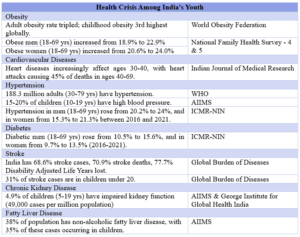
As the world celebrates International Youth Day, it is important to address the pressing health challenges faced by India’s young population. Among these, the rising incidence of non-communicable diseases is particularly worrying. Unhealthy diets and sedentary lifestyles demand urgent interventions, including enforcing regulations against misleading food claims, incentivising healthier food production, making nutritious foods more accessible, and leveraging technology and social media for health education. A key step in this effort is the implementation of front-of-pack warning labels (FOPWL) on all packaged foods to promote informed consumer choices.
The table below highlights the alarming increase in obesity, cardiovascular diseases, hypertension, diabetes, stroke, chronic kidney disease, and fatty liver disease among India’s youth. According to the ICMR, 56.4% of India’s disease burden is due to unhealthy diets. The consumption of highly processed foods high in sugars and fats, combined with reduced physical activity, exacerbates micronutrient deficiencies and various NCDs. The International Youth Day is an opportunity to spread awareness about these silent killers.
READ I Google under fire: Ruling by US judge may shake up internet search market

International Youth Day: Time to highlight a growing crisis
The Economic Survey 2024 notes that social media, excessive screen time, and unhealthy food habits significantly impact India’s economy. For the working-age population to be productive, they need both skills and good health. However, the current trend of sedentary lifestyles and the consumption of ultra-processed foods undermines public health and productivity, ultimately diminishing India’s economic potential.
The Economic Survey also indicates that the private sector’s promotion of unhealthy habits is shortsighted. India’s traditional lifestyle, food, and recipes, which have supported healthy living for centuries, present a commercial opportunity for businesses to promote these practices globally. Therefore, a multifaceted approach is essential. Encouraging the private sector to endorse nutritious options can be facilitated through government incentives and stricter regulations on the marketing of unhealthy foods.
Unhealthy diets, not vaccines
A recent study published in the Indian Journal of Medical Research reveals a rise in heart attacks among young adults and those in their 30s and 40s in India, with heart attacks accounting for up to 45% of deaths in the 40-69 age group. Contrary to some beliefs, these sudden deaths in young adults are not linked to COVID-19 vaccination. Instead, factors such as prior COVID-19 hospitalisation, a family history of sudden death, and certain lifestyle choices are more significant contributors to the risk of unexplained sudden death.
FOPWLs are a simple yet powerful tool in combating unhealthy eating habits. These labels provide clear, concise information about the nutritional quality of food products, helping consumers make informed choices quickly. In countries where FOPWLs have been implemented, there has been a notable reduction in the purchase of unhealthy food items. For India’s youth, who often make quick dietary decisions, these labels can significantly impact health outcomes.
Clear warning labels can deter them from impulsively reaching for junk foods and encourage them to choose more nutritious alternatives. Over time, this can lead to improvements in overall health, including lower rates of obesity, diabetes, and other diet-related diseases. Furthermore, implementing warning labels on unhealthy food packages would compel companies to reformulate their products to be healthier.
International Youth Day: Focus on awareness
Young people are not just passive recipients of health information; they are active agents of change. By educating them about the importance of FOPWL, we empower them to take control of their health, influence their peers and families, and advocate for FOPWL regulation. Eating healthy should be seen as “cool,” with youth leading this narrative and serving as role models for younger children.
On this International Youth Day, let us commit to creating a healthier environment for our young people by introducing FOPWL. This crucial step will help the youth of India make better dietary choices, combat the NCD epidemic, and foster a generation dedicated to good health. Together, we can pave the way for a more informed, healthier generation ready to lead our nation toward a brighter future.
(Simi TB works for CUTS International, a global public policy research and advocacy group.)
